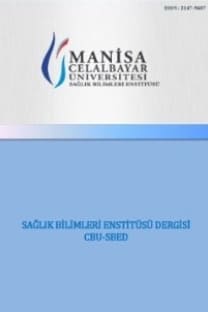Kanser Tedavisinin İşlevsel Değerlendirmesi Ölçeği FACT-G Türkçe Versiyonunun Geçerlik ve Güvenilirliği
Kanser, Yaşam kalitesi, Kanser tedavisinin işlevsel değerlendirme ölçeği (FACT-G), Geçerlilik, Güvenilirlik
The Functional Assessment of Cancer Therapy General FACT-G Scale Reliability and Validity of a Turkish Version
Cancer, Quality of life, The functional assessment of cancer therapy general scale (FACT-G), Validity, Reliability,
___
- 6.References 1. World Health Organization (WHO). Available at http://www.who.int/cancer/en/ (accessed 09.01. 2020) 2. Orley J, Kuyken W. Quality of Life Assessment: International Perspectives. Proceedings of The Joint meeting Organized by the WHO and the Foundation IPSEN in Paris; 1993, pp 41-57. 3. Cella D, Stone AA. Health-related quality of life measurement in oncology: advances and opportunities. American Psychologist, 2015, 70:175-185. 4. Marcel WM. Definitions of quality of life: what has happened and how to move on. Top Spinal Cord Injury Rehabilitation Summer, 2014, 20 (3): 167-180. 5. Cella DF, Bonomi AE, Lloyd SR, Tulsky DS, Kaplan E, Bonomi. Reliability and validity of the Functional Assessment of Cancer Therapy-Lung (FACT-L) quality of life instrument. Lung Cancer, 1995, 12: 199-220. 6. Hunt SM, Alonso J, Bucquet D, Niero M, Wiklund, I, McKenna S. European group for Health Measurement and Quality of Life Assessment: Cross-cultural adaptation of health measures. Health Policy, 1991, 19:33-44. 7. Aaronson NK, Ahmedzai S, Bergman B, Bullinger M, Cull A, Duez NJ, Filiberti A, Flechtner H, Fleishman SB, de Haes JC, et al.The European Organization for Research and Treatment of Cancer QLQ-C30: a quality-of-life instrument for use in international clinical trials in oncology. Journal of the National Cancer Institute, 1993, Mar 3;85(5):365-76. 8. www.eortc.org. Available from: http://groups.eortc.be/qol/eortc-qlq-c30 (accessed 10.01.2020). 9. Cella DF, Tulsky DS, Gray G, Sarafian B, Linn E, Bonomi, A, Silberman M, Yellen SB, Winicour P, Brannon J. The Functional Assessment of Cancer Therapy Scale: development and validation of the general measure. Journal of Clinical Oncology, 1993, 11:570-79. 10. Brady MJ, Cella DF, Mo F, Bonomi AE, Tulsky DS, Lloyd SR, Deasy S, Cobleigh M, Shiomoto G. Reliability and validity of the Functional Assessment of Cancer Therapy-Breast (FACT-B) quality of life instrument. Journal of Clinical Oncology, 1997, 15(3):974-86. 11. Webster K, Cella D, Kost K. The functional assessment of chronic illness therapy (FACIT) measurement system: properties, applications, and interpretation. Health Quality Life Outcomes, 2003, 1:1-7. 12. Costet N, Lapierre V, Benhamou E, Le, Galès C. Reliability and validity of the Functional Assessment of Cancer Therapy General (FACT-G) in French cancer patients. Quality of Life Research, 2005, Jun;14 (5):1427-32. 13. Lyons KD, Bakitas M, Hegel MT, Hanscom B, Hull J, Ahles TA. Reliability and Validity of the Functional Assessment of Chronic Illness Therapy- Palliative Care (FACIT-Pal) Scale. J Pain Symptom Manage, 2009, January, 37:1. 14. Winstead-Fry P, Schultz A. Psychometric Analysis of the Functional Assessment of Cancer Therapy-General (FACT-G) Scale in a rural sample. Cancer, 1997, 79: 2446-52. 15. Smith AB, Wright P, Selby PJ, Velikova GA. Rasch and factor analysis of the Functional Assessment of Cancer Therapy-General (FACT-G). Health Quality Life Outcomes, 2007, 5:19. 16. Sánchez R, Ballesteros M, Arnold BJ (2011). Validation of the FACT-G scale for evaluating quality of life in cancer patients in Colombia. Quality of Life Research, Feb; 20 (1):19-29. 17. Dapueto JJ, Francolino C, Servente L. Chang CH, Gotta I, Levin R, Abreu Mdel C. Evaluation of the Functional Assessment of Cancer Therapy-General (FACT-G) Spanish Version 4 in South America: Classic psychometric and item response theory analyses. Health Qual Life Outcomes, 2003, 1:32. 18. Jöreskog KG, Sörbom D. LISREL 8: Structural equation modeling with the SIMPLIS command language: Scientific Software International; 4th ed. Lawrence Erlbaum Associates, Inc, Chicago, IL, US, 1998. 19. Şimşek, ÖF. Introduction to Structural Equation Modeling-Basic Principles and LISREL Applications, Turkey, Ekinoks Press, 2007, Ankara. 20. Schermelleh-Engel K, Moosbrugger H, Müller H. Evaluating the fit of structural equation models: Tests of significance and descriptive goodness of fit measures. MPR Online, 2003, 8: (2) 23-74. Available from:http://www.mpr-online.de (accessed 10.02.2020). 21. Büyüköztürk Ş. Sosyal Bilimler İçin Veri Analizi El Kitabı. 24th edition. Pegem Akademi Publishers. Ankara, 2008, pp 179-193. 22. Santos JRA. Cronbach's alpha: A tool for assessing the reliability of scales. The Journal of Extension, 1999, ,37:(2). 23. Gözüm S, Aksayan S. A guide for transcultural adaptation of the scale II:psychometric characteristics and crosscultural comparison. HEMAR-G, 2003, 5(1): 3-14. 24. http://www.facit.org (accessed 25.05. 2017). 25. Winstead-Fry P, Schultz A. Psychometric Analysis of the Functional Assessment of Cancer Therapy-General (FACT-G) Scale in a Rural Sample. Cancer, 1997, 79:2446-52.
- ISSN: 2147-9607
- Yayın Aralığı: Yılda 4 Sayı
- Başlangıç: 2014
- Yayıncı: Manisa Celal Bayar Üniversitesi Sağlık Bilimleri Enstitüsü
Eosinofilik Granülomatoz Polyangiitis Sonrası Görülen Sitomegalovirus Enfeksiyonu - Olgu Sunumu
Kezban Armağan ALPTÜRKER, Özgül SOYSAL GÜNDÜZ, Nurullah AKKOÇ
Gebelerin Fiziksel Aktivite Düzeyleri ve Yaşam Kalitelerinin İncelenmesi
Aslı GÖKER, EMRE YANIKKEREM, Özge TOPSAKAL
DİLEK ONGAN, Berna AĞIL, Gamze YURTDAŞ, Hüsnü YILMAZ, Emre ONGAN, Devrim DÖLEK
Manyetik Kateter Yönlendirme Sistemleri
Özge AKBÜLBÜL, Mert ŞENER, Gökhan ÖZDEMİR, Aylin ŞENDEMİR, Ece BAYIR, Tuncay GÖKSEL, Haydar Soydaner KARAKUŞ, MUTLU BOZTEPE, Levent ÇETİN, Gökmen Atakan TÜRKMEN, BARIŞ OĞUZ GÜRSES, AYSUN BALTACI
Geçmişten Günümüze Değişen Babalık Rolü ve Çocuk Gelişimine Katkıları
Mustafa BELLİ, Nurdan AKÇAY DİDİŞEN, Hatice BAL YILMAZ
Akut ST Yükselmeli Miyokard Enfarktüsünde Sol Ana Koroner Stentleme Olgusu
Hakan GÖÇER, Ahmet Barış DURUKAN
Kurkumin’in MCF-7 Meme Kanseri Hücreleri Üzerine GSK-3beta ve VEGF Sinyali Aracılı İnhibitör Etkisi
Pektus Ekskavatum ve Pektus Karinatumlu Hastalarda Görülen Postür Bozuklukları
